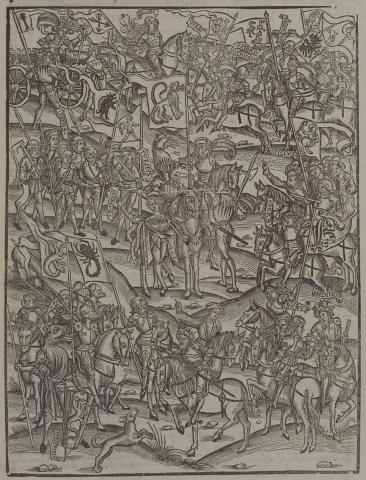CORE VOCABULARY
nec or neque: (adv. and conj.), and not; neither, nor, 1.643, et al.; in prohibition, 3.394, et al.; neque (nec) — neque (nec), neither — nor, 5.21, et al.; nec — et, or -que, may be rendered neither — nor, 12.801; 2.534; nec nōn, and also, nor less, 6.183; nec nōn et, and also, 1.707.
indictus, a, um: (adj.), unmentioned; unsung, unrecorded, 7.733.
abeō, īvī, or iī, itus, īre, irreg. n.: to go away, depart, 2.675; go off, go aside, turn off, 5.162; pass into, sink into, 9.700; go forward, take the lead, 5.318; retreat, 2.382; change or be transformed.
Oebalus, ī, m.: an Italian prince, ally of Turnus, 7.734.
generō, āvī, ātus, 1, a.: to beget, w. abl. of source, 7.734; produce; p., generātus, a, um, descended, sprung from, 5.61. (genus)
Telōn, ōnis, m.: king of the Teleboans in the island of Capreae, 7.734.
Sēbēthis, idis or idos, f.: the daughter of Sebethus, a river or river-god of Campania, 7.734.
nympha, ae, f.: a bride, a maiden; a nymph, one of the inferior deities, presiding over fountains, woods, etc., 1.71, et al.
Tēleboae, ārum (um), m.: a people of Acarnania, a part of whom migrated to the island of Capreae in the Bay of Naples, 7.735.
Capreae, ārum, f.: Capreae, now Capri, an island in the Bay of Naples, 7.735. (caper)
senex, senis: (adj.), old, aged, hoary, 7.180; (comp.) senior, ōris, older; very aged, 5.179; hoary, 5.704.
patrius, a, um: adj. (pater), pertaining to one's father or ancestors; a father's, 2.658; paternal, natural to a father, 1.643; exacted by a father, 7.766; due to, felt for a father or parent, 9.294; ancestral, hereditary, 3.249; of one's country, native, 3.281; belonging to the nation, of the country, 11.374.
fīlius, iī, m.: a son, 1.325. (rel. to fēmina)
contendō, ī, tentus, 3, a.: to stretch completely; stretch, strain; strain the bow, 12.815; level the arrow, 5.513; shoot, 5.520; endeavor, strive, 1.158; contend, 4.108; hold, steer, 5.834; contend in skill of any kind.
lātē: (adv.), widely; far and wide, 1.21; on all sides, far around, 1.163; all over, 12.308. (lātus)
diciō, ōnis, f.: dominion, power, sway, rule, 1.622. (only in gen., dat., acc., and abl. sing.)
Sarrastēs, um, m.: the Sarrastes, a people dwelling near the Sarnus, 7.738.
rigō, āvī, ātus, 1, a.: to moisten, wet, bedew, 6.699; bespatter, stain, 12.308.
Sarnus, ī, m.: a river running into the Bay of Naples near Pompeii, 7.738.
Rufrae, ārum, f.: a town of Campania, 7.739.
Batulum, ī, n.: a Samnite town in Campania, 7.739.
Celemna, ae, f.: a town of Campania, 7.739.
mālifer, era, erum: fruit-producing, fruitful, 7.740.
dēspectō, āvī, ātus, 1, intens. a.: to look down upon, 1.396. (dēspiciō)
Abella, ae, f.: Abella, a town in Campania, N.E. of Naples, 7.740.
Teutonicus, a, um: adj. (Teutonī), of the Teutons, Teutonic, Germanic, 7.741.
rītus, ūs, m.: a farm of religious ceremonial; a form, rite, 12.836; custom, manner, 7.741; abl., rītū, in the manner of, like, 11.611.
torqueō, torsī, tortus, 2, a.: to wind, turn, twist, 4.575; roll along, 6.551; whirl, hurl, 3.208; shoot, 5.497; cast, dash, 1.108; direct, 4.220; turn away, 6.547; turn, cause to revolve, 4.269; control, 12.180; p., tortus, a, um, whirled, whirling, impetuous, 7.567.
catēia, ae, f.: a slender javelin, 7.741.
tegmen (tegumen), inis, n.: a means of covering; skin, hide, 1.275; clothing, 3.594; shield, 9.577; tegmen crūrum, close-fitting trousers worn by Phrygians, 11.777. (tegō)
sūber, eris, n.: the cork tree, 7.742.
cortex, icis, m.: the bark, rind, 3.33.
aerātus, a, um: adj. (aes), furnished with copper, bronze; made of bronze, 2.481; bronze-covered; with brazen prow, 8.675; armed with bronze; armed, 7.703.
micō, micuī, 1, n.: to vibrate, dart, 2.475; flash, glitter, gleam, 1.90; tremble, quiver, 10.396.
pelta, ae, f.: a light crescent-shaped shield, 1.490.
aereus, a, um: adj. (aes), made of copper or bronze; bronze, brazen (see def. of aes), 1.448; brazen beaked, 5.198; of the copper or bronze plates or scales of a corselet, 10.313.
ēnsis, is, m.: a sword, 2.393, et al.; knife, 2.155.

